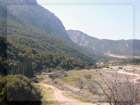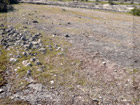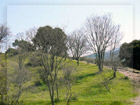
 |
| MAIN |
| Introduction |
| Greek Preparations |
| Armies |
| Battlefield |
| Battle |
| Aftermath |
| Date |
| Monuments |
| COMPLEMENTARY |
| Thermopylae |
| Leonidas I |
| Xerxes I |
| Sparta |
| Thespiae |
| Molon Labe |
| Battle |
|||||
| Arrival of the Persians On the Persian army's arrival to the battle scene, Greek troops instigated a council meeting. Some Peloponnesians suggested withdrawal to the Isthmus and blocking the passage to Peloponnesus. They were well aware that the Persians would have to go through Athens in order to reach them there. The Phocians and Locrians, whose states were located nearby, became indignant and advised defending Thermopylae and sending for more help. Leonidas and the Spartans agreed with the Phocians and Locrians. Meanwhile, the Persians entered the pass and sent a mounted scout to reconnoiter. The Greeks allowed him to come up to the camp, observe them, and depart. When the scout reported to Xerxes the size of the Greek force and that the Spartans were indulging in calisthenics and combing their long hair, Xerxes found the reports laughable. Seeking the counsel of an exiled Spartan in his employ, Demaratus, Xerxes was told that the Spartans were preparing for battle and that it was their custom to adorn their hair beforehand. The exile called them "the bravest men in Greece" and warned the Great King that they intended to dispute the pass. Xerxes remained incredulous. According to another account, he sent emissaries to the Greek forces. At first, he asked Leonidas to join him by offering the kingship of all Greece. Leonidas answered: "If you knew what is good in life, you would abstain from wishing for foreign things. For me it is better to die for Greece than to be monarch over my compatriots." Then Xerxes asked him more forcefully to surrender their arms. To this Leonidas gave his noted answer: Μολών Λαβέ meaning "Come take them". This quote has been repeated by many later generals and politicians in order to express an army's or nation's determination to not surrender without a battle.
Despite their extremely disproportionate numbers, Greek morale was high. Herodotus writes that when Dienekes, a Spartan soldier, was informed that Persian arrows would be so numerous as "to blot out the sun", he remarked with characteristically laconic prose, "So much the better, we shall fight in the shade." Xerxes waited four days for the Greek force to disperse. On the fifth day he ordered the Medes and the Cissians to take the Greeks prisoner and bring them before him. Failure of the frontal assault Xerxes sent in the Medes who had been only recently conquered by the Persians perhaps, as Diodorus Siculus suggested, because he wanted them to bear the brunt of the fighting. The Medes soon found themselves in a frontal assault. The Greeks had camped on either side of the rebuilt Phocian wall. That the wall was guarded shows that the Greeks were using it to establish a reference line for the battle, but they fought in front of it.
Details of the tactics are somewhat scant. The Greeks probably deployed
in a phalanx, a wall of overlapping shields and layered spearpoints,
spanning the entire width of the pass. Herodotus says that the units
for each state were kept together. The Persians, armed with arrows
Yet there are some indications the Greeks did not fight entirely in close formation. They made use of the feint to draw the Medes in, pretending to retreat in disorder only to turn suddenly and attack the pursuing Medes. In this way they killed so many Medes that Xerxes is said to have started up off the seat from which he was watching the battle three times. According to Ctesias, the first wave numbered 10,000 soldiers and were commanded by Artapanus. The king eventually withdrew the Medes. Having taken the measure of the enemy, he threw the best troops he had into a second assault: the Immortals, an elite corps of 10,000 men. On his side, Leonidas had arranged a system of relays between the hoplites of the various cities so as to constantly have fresh troops on the front line. In the heat of the battle, however, the units did not get a chance to rotate. Being able to approach the Greek line only in such numbers as the space allowed, the Immortals fared no better than the Medes. Xerxes had to withdraw them as well. The first day of battle probably ended there. On the second day, the assault failed again. The account of the slain gives some indication why: the wall of bodies must have broken up the Persian line and detracted from their morale. Climbing over the bodies, they could see that they had stepped into a killing machine but the officers behind prevented them from withdrawing. Xerxes at last stopped the assault and withdrew to his camp, totally perplexed. He now knew that a head-on confrontation against Spartan-led troops in a narrow place was the wrong approach. Encirclement of the Greeks Late on the second day of battle, as the king was pondering what to do next, he received a windfall: a Malian Greek traitor named Ephialtes informed him of a path around Thermopylae and offered to guide the Persian army through the pass. Herodotus notes that two other men were accused of betraying this trail to the Persians: Onetas, a native of Carystus and son of Phanagoras, and Corydallus, a native of Anticyra, but argues Ephialtes was the one who revealed this trail because "the deputies of the Greeks, the Pylagorae, who must have had the best means for ascertaining the truth, did not offer the reward on the heads of Onetas and Corydallus, but for that of Ephialtes of Trachis". The path led from east of the Persian camp along the ridge of Mt. Anopaea behind the cliffs that flanked the pass. It branched with one path leading to Phocis and the other down to the Gulf of Malis at Alpenus, first town of Locris. Leonidas had stationed 1,000 Phocian volunteers on the heights to guard that path. Despite their indignation and determination on defending Thermopylae, the Phocians were not expecting such an outcome: There were no advance positions, sentinels, or patrols. Their first warning of the approach of the Immortals under Hydarnes was the rustling of oak leaves at first light on the third day of the battle. Herodotus says that they "jumped up", suggesting that the Greek force was still asleep, and were "greatly amazed", which no alert unit should have been. Hydarnes was as amazed to see them hastily arming themselves. He feared that they were Spartans, but was enlightened by Ephialtes. Not wishing to be delayed by an assault, Hydarnes resorted to a tactic that later turned out to be a victorious one: He fired "showers of arrows" at them. The Phocians retreated to the crest of the mountain to make their stand. The Persians branched left to Alpenus. Ephialtes was motivated by the desire of a reward, but this came to nothing when the Persians were later defeated at the Battle of Salamis. He then fled to Thessaly; the Amphictyons at Pylae had offered a reward for his death. According to Herodotus he was killed for an apparently unrelated reason by Athenades of Trachis, around 470 BC; but the Spartans rewarded Athenades all the same. For this act, the name of Ephialtes received a lasting stigma: it means "nightmare" and is synonymous with "traitor" in Greek. Final stand of the Spartans and Thespians None
of the Persians' actions surprised Leonidas. From a variety of
sources, he was kept apprised of their movements and received
intelligence of When Leonidas learned that the Phocians had not held, he called a council at dawn. During the council some Greeks argued for withdrawal in the face of the overwhelming Persian advance, while others pledged to stay. After the council, many of the Greek forces did choose to withdraw. Herodotus believed that Leonidas blessed their departure with an order, but he also offered the alternate point of view that those retreating forces departed without orders. The Spartans had pledged themselves to fight to the death, while the Thebans were held as hostage against their will. However, a contingent of about 700 Thespians, led by general Demophilus, the son of Diadromes, refused to leave with the other Greeks, but cast their lot with the Spartans. Ostensibly, the Spartans were obeying their oath and following the oracle of Delphi. However, it might also have been a calculated strategy to delay the advance of the Persians and cover the retreat of the Greek army. In fact, with the Persians so close at hand, the decision to stand and fight was probably a tactical requirement only made more palatable by the oracle. At dawn Xerxes made libations. He paused to allow the Immortals sufficient time to descend the mountain, and then began his advance. The Greeks this time sallied forth from the wall to meet the Persians in the wider part of the pass in an attempt to slaughter as many Persians as they could. They fought with spears until every spear was shattered and then switched to xiphoi (short swords). In this struggle, Herodotus tells us that two brothers of Xerxes fell: Abrocomes and Hyperanthes. Leonidas also died in the assault. Receiving intelligence that Ephialtes and the Immortals were advancing toward the rear, the Greeks withdrew and took a stand on Kolonos a small hill behind the wall. The Thebans deserted to the Persians but a few were slain before their surrender was accepted. While some of the remaining Greeks fought with their xiphoi, some were left with only their hands and teeth. Tearing down part of the wall, Xerxes ordered the hill surrounded and the Persians rained down arrows until the last Greek was dead. Archaeologists have found evidence of the final arrow shower.
Permission is granted to copy, distribute and/or modify this article under the terms of the GNU Free Documentation License, Version 1.2 or any later version published by the Free Software Foundation.
(What does it mean?)
The text is based on material from the Wikipedia article "Battle of Thermopylae". Modifications, additions to the Wikipedia text and all the photos by the website author. |
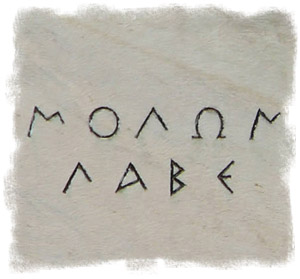
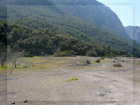
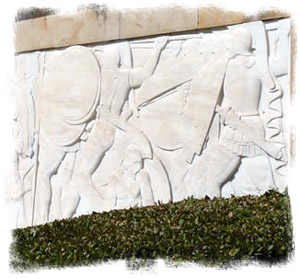 and short spears, could not break through the long spears of the
phalanx, nor were their lightly armoured men a match for the
superior armour, weaponry, and discipline of the hoplites.
and short spears, could not break through the long spears of the
phalanx, nor were their lightly armoured men a match for the
superior armour, weaponry, and discipline of the hoplites.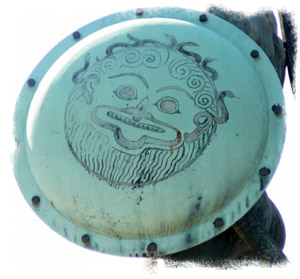 the Persian outflanking movement before first light.
the Persian outflanking movement before first light.